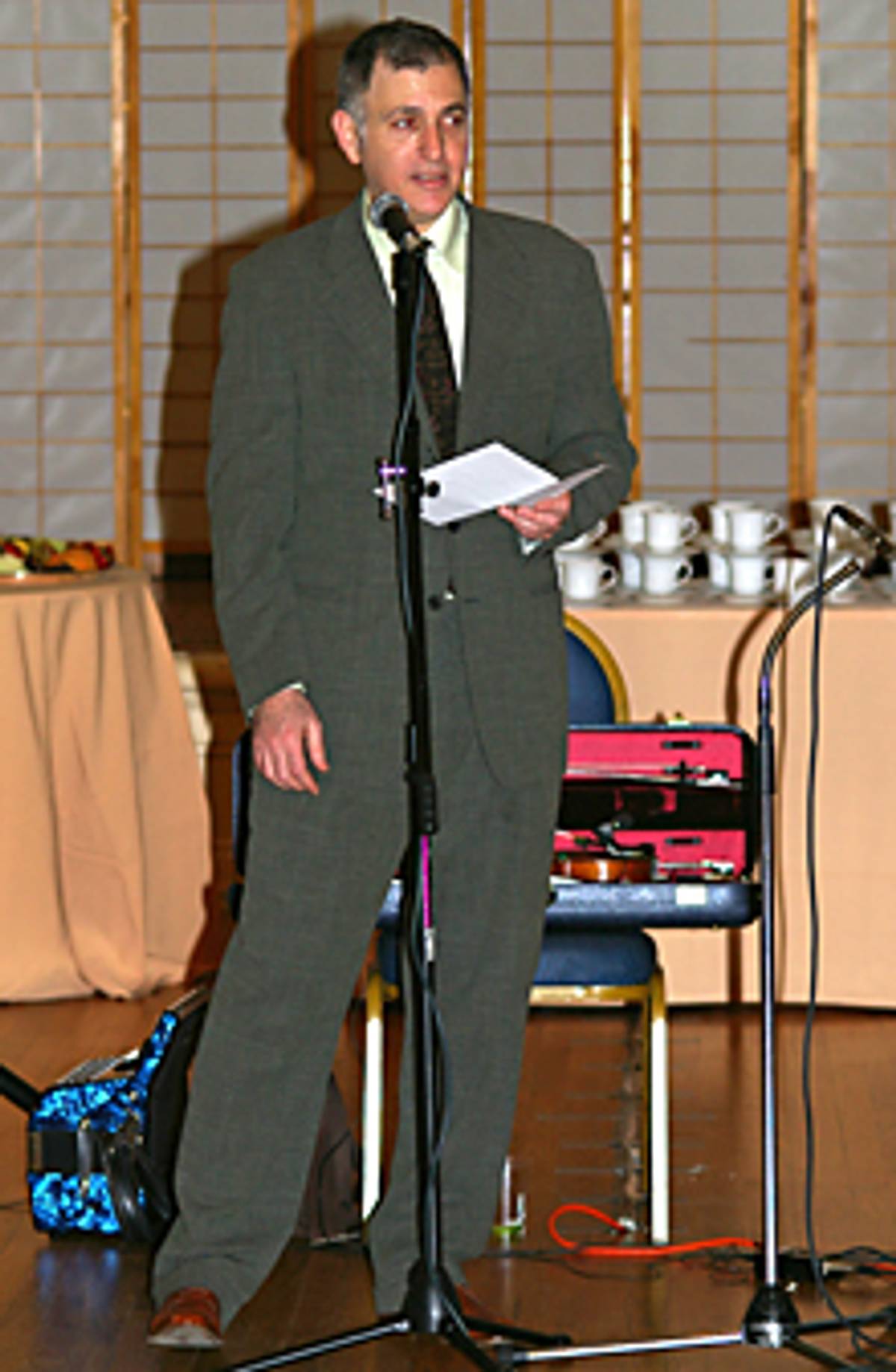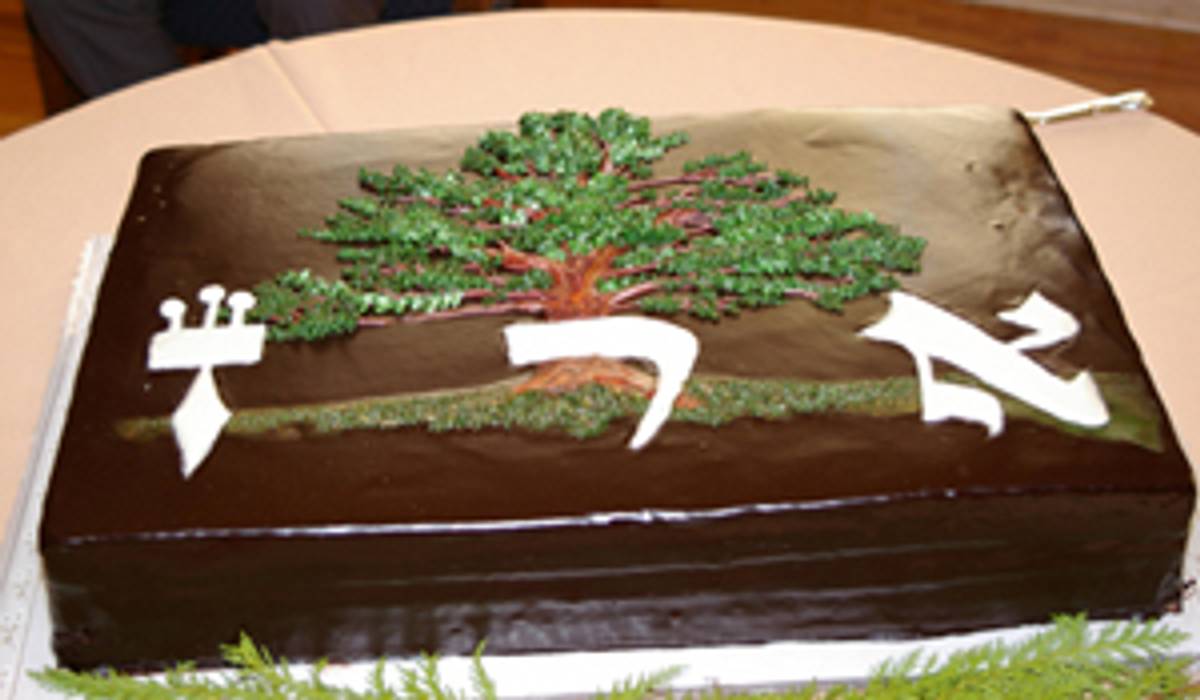By the time I awoke on the morning of Erez’s bar mitzvah ceremony, it seemed that the event was already over, and not just because we had already survived the Friday night service, which was led by the student cantor in a folk-Broadway style that made it sound like a production of Pippin. (You haven’t really experienced L’chah Dodi until you’ve heard it done à la Fosse.) Actually, that was rather pleasant; the cantor has a gorgeous voice and we had no expectations. But today would be different, and my first thought upon rising was that everything we’d planned for the last 12 months, or left unplanned, would now have to fend for itself; any human agency in the matter was moot. Disaster or triumph, it was all on automatic.
That was only partly true. For one thing, there are always more decisions to make, and more to discover you’ve forgotten to make. Yes, we had bought Erez’s clothes, but Andy and I had never agreed on which of the two new ties he should wear, the iridescent check or the mod swirls. (I lost the ensuing “discussion”; he wore the check.) The matter of my own outfit I had completely overlooked. And when we arrived at the synagogue an hour before the service, I found the party room—which was supposed to have been set up the previous night according to the color-coded plan and itemized lists I’d drawn—looked like a prison cafeteria, with long rectangular tables arranged in regimental banks.
I didn’t have time to freak out or start hauling furniture, so I deputized a friend to do just that, and ran downstairs, to the sanctuary, for “rehearsal.” At the time, the idea of

rehearsing a spiritual occasion seemed bizarre to me, proof that nothing spiritual would be going on that day. “When you sit on the pulpit, please don’t cross your legs,” the rabbi told us. “When I hand you the Torah…” It sounded like a pageant.
But when the service started at 10:30, my anxiety and cynicism dissolved, a sensation not unlike the creeping oblivion of the Valium-Demerol drip during a colonoscopy. Things that normally would freak you out instead look fascinating, even beautiful. Something’s probing your insides, but you don’t actually mind.
Erez, who said he was nervous, appeared anything but. And we had plenty of time to look at him because, to my surprise, he was on the pulpit the entire time, not just during his bits. He was actively involved in all parts of the service, more like an apprentice rabbi than a 13-year-old boy who frequently has to be reminded to brush his teeth. He led prayers with confidence, his Hebrew clear and loud. He looked up and out, often smiling. I was stunned. Who was this person? He was, of course, our son, but (the ceremony seemed to be saying) not only our son.
Eventually, the rabbi called me and Andy and my father to the pulpit. We sat as instructed, with our legs uncrossed, until, at the beginning of the Torah service, she nodded and we walked to our appointed places. She opened the ark behind us and took out a Torah, which she then handed to my father. He handed it to me; I to Andy; Andy to Erez. The symbolism, literally heavy-handed, was no less powerful for that, even including the little nontraditional dogleg from me to Andy. Erez received the Torah as easily as if it were a football, then handed it over to his cousin Michael, whom we had judged most likely not to drop it as we marched through the congregation.
Because our seats were in the front row, and because I had basically frozen in place there since the service began, this was the first time I got to see everyone who had come. The vagaries of availability and the limits of our budget resulted in a congregation that represented a very strange cross-section of our lives. A 19th cousin, a babysitter, a dear friend next to—who was that? They hugged and high-fived us, pushed into the aisles to be part of the moment in the way I’d seen the crowds do at State of the Union addresses, except without the moron in the middle. They seemed unambivalent in their delight. Only then did it really occur to me that the bar mitzvah ceremony is not only for the bar mitzvah family.
Erez proceeded to chant his Torah and haftarah portions as if he’d done so a million times. (Well, of course, he had; thanks, Trope Trainer!) Looking like an irrepressibly genial funeral director, he shook the hands of everyone called for an aliyah, then hugged them when they finished. The biggest hug he saved for his younger brother; Lucas got lifted three feet off the ground after reading the “sibling’s prayer”—which despite the actual words was probably something like “Please, God, don’t make this happen to me.” But even he was ecstatic.
Even he; even I. That moment was a highlight for me because in it I saw my sons pure and openhearted: the dust of cynicism and ’tween attitude, however lightly it normally lay upon them, completely blown off. For others, the highlight was Erez’s militantly anti-Bush d’var Torah: “We were, like the Israelites,” he said, “easily misled by an unreliable leader.” His call for a new Moses (“Her name might be Hillary. His name might even be Barack—or is it Baruch?”) set off a round of thunderous applause as he ended.

But the most intense—dare I say spiritual?—moment came at the end of the Torah service, when the rabbi stood with Erez in front of the ark to give him her benediction. I certainly was not expecting anything meaningful; the benedictions I was used to were notable only for the extreme anesthetic quality of their clichés and the singsong whine of Received Rabbinical Sprechstimme. I knew that our rabbi wouldn’t give that kind of talk, but I couldn’t imagine what kind she would. And in fact she didn’t give any kind of talk. That is, she talked to Erez—only to him—for two, three, it might as well have been ten minutes. We could not hear what she said; she wasn’t speaking to us but to him. At first I was annoyed: Hey, I paid for this bar mitzvah, I want to hear the climactic words! But then I watched as Erez listened raptly, smiling when she placed her hands upon his head and recited the peculiar, ancient words: “May the Lord cause His countenance to shine upon you…” We in the congregation, 19th cousins no less than us, his parents, were only witnesses to this benediction, not part of it.
I had heard endlessly about the community, how part of becoming a bar mitzvah was taking your place before that august body of synagogue dues-payers and assorted hangers-on. I had never considered myself part of such a community, not for myself and certainly not as an audience for my son’s growth. (Why should I? The community wasn’t helping to pay the bills.) The ritual brilliantly put me in my place by putting Erez in his. It was, after all, his life, and to a greater and greater extent going forward, we would be mere witnesses to it. Even now, he had formed something like an adult relationship with the rabbi, on his own, not triangulated through us, and had private dealings with her.
I can’t speak for God, but many countenances were caused to shine at that moment. The voyage Erez was embarking upon would necessarily leave us onshore; we are all émigrés from our parents. At the lunch immediately following the service—a dreamlike phantasmagoria of images I can still hardly parse—my father made that point in a brief speech he delivered between the main course and dessert. “At my bar mitzvah about 68 years ago,” he said, “my father, as was our custom on those occasions, felt constrained to make some ecclesiastical remarks. In essence he said that you will soon forget the excitement, the gifts and the parties, but you will long remember”—here he paused as if to think—”And while I do remember the excitement, the gifts and the parties,” he went on, “I have totally forgotten what it was he said I would long remember.”
Erez listened dutifully, not only to my father (whose theme was that Erez, having been adopted and raised as a Jew, was a doubly chosen person) but also to Andy and me and the countless (well, 142) guests who shook his hand, hugged him, stuffed envelopes in his hand. But of all the things he will long remember the most memorable may be the thing I tried to prevent. For despite my having ruled against it as an alien intrusion into the bar mitzvah ritual, at some point he was carried aloft in a chair on a sea of people who loved him. Then Lucas was, then Andy, then I. As the klezmer duo wailed its joyful, stinging melodies, we were both above the experience and also in it. And soon enough, as the chairs tipped, below it. Even twentysomethings get tired of holding up middle-aged men.

Nothing failed to go well. The food, the flowers, the music and the room, transformed by the magic of dimmer switches and tea lights (and a hasty rearrangement of the tables), were all lovely. As we packed ourselves into the van at 3:30 that afternoon, Andy and I realized we had carried off our difficult agenda. Between the Scylla of ostentation and the Charybdis of skimpiness, we had steered a narrow course, though even so, it was not without shocking outlays of money. (Modesty is expensive.) It would become tempting later on, as Erez slowly opened those envelopes, to pay for that precision with his mounting booty.
But paying for it was tomorrow’s job. When we got home it was immediately time to turn around and prepare the house for the “boy-girl dance party” that Erez had requested instead of the originally planned stag bowling for his informal all-kid event. At 7 p.m., a parade of stunning 13-year-old girls started arriving, followed by a bunch of awkward Smurfs who were apparently the 13-year-old boys. On the so-called dancing I draw the curtain of privacy, except to say that Erez, in his Hawaiian shirt and cropped cargo pants, was not the child we knew. He was becoming someone else—a yacht’s captain?—and perhaps for this reason, Andy and I holed up in the kitchen with a few friends, heating and quickly delivering into the living room an endless supply of greasy food. We did not want to look too closely; we already knew that the boat, though still in dock, was pointing out to sea.